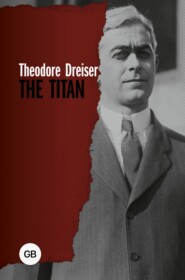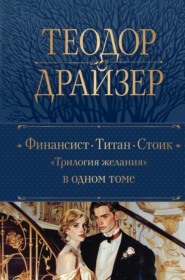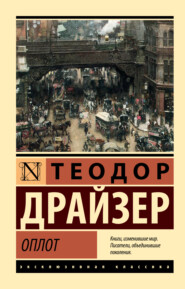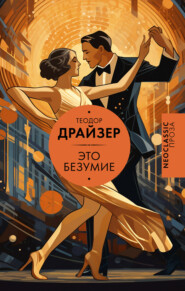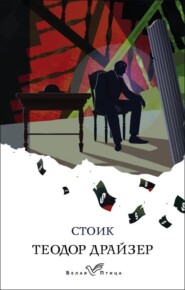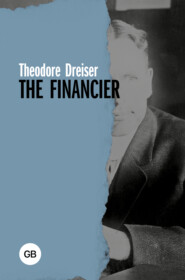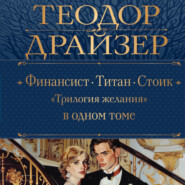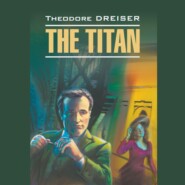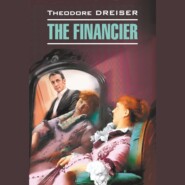По всем вопросам обращайтесь на: info@litportal.ru
(©) 2003-2025.
✖
The "Genius"
Настройки чтения
Размер шрифта
Высота строк
Поля
Little Marietta how she would cry. And old Jotham – she could see him, but he would never be really sure of the truth. And her mother. "Oh God in heaven," she thought, "how hard life is! How terrible it can be."
CHAPTER XXVII
The atmosphere of the house after this night seemed charged with reproach to Eugene, although it took on no semblance of reality in either look or word. When he awoke in the morning and looked through the half closed shutters to the green world outside he felt a sense of freshness and of shame. It was cruel to come into such a home as this and do a thing as mean as he had done. After all, philosophy or no philosophy, didn't a fine old citizen like Jotham, honest, upright, genuine in his moral point of view and his observance of the golden rule, didn't he deserve better from a man whom he so sincerely admired? Jotham had been so nice to him. Their conversations together were so kindly and sympathetic. Eugene felt that Jotham believed him to be an honest man. He knew he had that appearance. He was frank, genial, considerate, not willing to condemn anyone – but this sex question – that was where he was weak. And was not the whole world keyed to that? Did not the decencies and the sanities of life depend on right moral conduct? Was not the world dependent on how the homes were run? How could anyone be good if his mother and father had not been good before him? How could the children of the world expect to be anything if people rushed here and there holding illicit relations? Take his sister Myrtle, now – would he have wanted her rifled in this manner? In the face of this question he was not ready to say exactly what he wanted or was willing to countenance. Myrtle was a free agent, as was every other girl. She could do as she pleased. It might not please him exactly but – he went round and round from one problem to another, trying to untie this Gordian knot. One thing, this home had appeared sweet and clean when he came into it; now it was just a little tarnished, and by him! Or was it? His mind was always asking this question. There was nothing that he was actually accepting as true any more. He was going round in a ring asking questions of this proposition and that. Are you true? And are you true? And are you true? And all the while he was apparently not getting anywhere. It puzzled him, this life. Sometimes it shamed him. This deed shamed him. And he asked himself whether he was wrong to be ashamed or not. Perhaps he was just foolish. Was not life made for living, not worrying? He had not created his passions and desires.
He threw open the shutters and there was the bright day. Everything was so green outside, the flowers in bloom, the trees casting a cool, lovely shade, the birds twittering. Bees were humming. He could smell the lilacs. "Dear God," he exclaimed, throwing his arms above his head, "How lovely life is! How beautiful! Oh!" He drew in a deep breath of the flower and privet laden air. If only he could live always like this – for ever and ever.
When he had sponged himself with cold water and dressed, putting on a soft negligée shirt with turn-down collar and dark flowing tie, he issued forth clean and fresh. Angela was there to greet him. Her face was pale but she looked intensely sweet because of her sadness.
"There, there," he said, touching her chin, "less of that now!"
"I told them that I had a headache," she said. "So I have. Do you understand?"
"I understand your headache," he laughed. "But everything is all right – very much all right. Isn't this a lovely day!"
"Beautiful," replied Angela sadly.
"Cheer up," he insisted. "Don't worry. Everything is coming out fine." He walked to the window and stared out.
"I'll have your breakfast ready in a minute," she said, and, pressing his hand, left him.
Eugene went out to the hammock. He was so deliciously contented and joyous now that he saw the green world about him, that he felt that everything was all right again. The vigorous blooming forces of nature everywhere present belied the sense of evil and decay to which mortality is so readily subject. He felt that everything was justified in youth and love, particularly where mutual affection reigned. Why should he not take Angela? Why should they not be together? He went in to breakfast at her call, eating comfortably of the things she provided. He felt the easy familiarity and graciousness of the conqueror. Angela on her part felt the fear and uncertainty of one who has embarked upon a dangerous voyage. She had set sail – whither? At what port would she land? Was it the lake or his studio? Would she live and be happy or would she die to face a black uncertainty? Was there a hell as some preachers insisted? Was there a gloomy place of lost souls such as the poets described? She looked into the face of this same world which Eugene found so beautiful and its very beauty trembled with forebodings of danger.
And there were days and days yet to be lived of this. For all her fear, once having tasted of the forbidden fruit, it was sweet and inviting. She could not go near Eugene, nor he near her but this flush of emotion would return.
In the daylight she was too fearful, but when the night came with its stars, its fresh winds, its urge to desire, her fears could not stand in their way. Eugene was insatiable and she was yearning. The slightest touch was as fire to tow. She yielded saying she would not yield.
The Blue family were of course blissfully ignorant of what was happening. It seemed so astonishing to Angela at first that the very air did not register her actions in some visible way. That they should be able thus to be alone was not so remarkable, seeing that Eugene's courtship was being aided and abetted, for her sake, but that her lapse should not be exposed by some sinister influence seemed strange – accidental and subtly ominous. Something would happen – that was her fear. She had not the courage of her desire or need.
By the end of the week, though Eugene was less ardent and more or less oppressed by the seeming completeness with which he had conquered, he was not ready to leave. He was sorry to go, for it ended a honeymoon of sweetness and beauty – all the more wonderful and enchanting because so clandestine – yet he was beginning to be aware that he had bound himself in chains of duty and responsibility. Angela had thrown herself on his mercy and his sense of honor to begin with. She had exacted a promise of marriage – not urgently, and as one who sought to entrap him, but with the explanation that otherwise life must end in disaster for her. Eugene could look in her face and see that it would. And now that he had had his way and plumbed the depths of her emotions and desires he had a higher estimate of her personality. Despite the fact that she was older than he, there was a breath of youth and beauty here that held him. Her body was exquisite. Her feeling about life and love was tender and beautiful. He wished he could make true her dreams of bliss without injury to himself.
It so turned out that as his visit was drawing to a close Angela decided that she ought to go to Chicago, for there were purchases which must be made. Her mother wanted her to go and she decided that she would go with Eugene. This made the separation easier, gave them more time to talk. Her usual plan was to stay with her aunt and she was going there now.
On the way she asked over and over what he would think of her in the future; whether what had passed would not lower her in his eyes. He did not feel that it would. Once she said to him sadly – "only death or marriage can help me now."
"What do you mean?" he asked, her yellow head pillowed on his shoulder, her dark blue eyes looking sadly into his.
"That if you don't marry me I'll have to kill myself. I can't stay at home."
He thought of her with her beautiful body, her mass of soft hair all tarnished in death.
"You wouldn't do that?" he asked unbelievingly.
"Yes, I would," she said sadly. "I must, I will."
"Hush, Angel Face," he pleaded. "You won't do anything like that. You won't have to. I'll marry you – How would you do it?"
"Oh, I've thought it all out," she continued gloomily. "You know that little lake. I'd drown myself."
"Don't, sweetheart," he pleaded. "Don't talk that way. It's terrible. You won't have to do anything like that."
To think of her under the waters of little Okoonee, with its green banks, and yellow sandy shores. All her love come to this! All her passion! Her death would be upon his head and he could not stand the thought of that. It frightened him. Such tragedies occasionally appeared in the papers with all the pathetic details convincingly set forth, but this should not enter his life. He would marry her. She was lovely after all. He would have to. He might as well make up his mind to that now. He began to speculate how soon it might be. For the sake of her family she wanted no secret marriage but one which, if they could not be present at it, they could at least know was taking place. She was willing to come East – that could be arranged. But they must be married. Eugene realized the depth of her conventional feeling so keenly that it never occurred to him to suggest an alternative. She would not consent, would scorn him for it. The only alternative, she appeared to believe, was death.
One evening – the last – when it was necessary for her to return to Blackwood, and he had seen her off on the train, her face a study in sadness, he rode out gloomily to Jackson Park where he had once seen a beautiful lake in the moonlight. When he reached there the waters of the lake were still suffused and tinged with lovely suggestions of lavender, pink and silver, for this was near the twenty-first of June. The trees to the east and west were dark. The sky showed a last blush of orange. Odours were about – warm June fragrance. He thought now, as he walked about the quiet paths where the sand and pebbles crunched lightly beneath his feet, of all the glory of this wonderful week. How dramatic was life; how full of romance. This love of Angela's, how beautiful. Youth was with him – love. Would he go on to greater days of beauty or would he stumble, idling his time, wasting his substance in riotous living? Was this riotous living? Would there be evil fruition of his deeds? Would he really love Angela after he married her? Would they be happy?
Thus he stood by the bank of this still lake, studying the water, marvelling at the subtleties of reflected radiance, feeling the artist's joy in perfect natural beauty, twining and intertwining it all with love, death, failure, fame. It was romantic to think that in such a lake, if he were unkind, would Angela be found. By such a dark as was now descending would all her bright dreams be submerged. It would be beautiful as romance. He could imagine a great artist like Daudet or Balzac making a great story out of it. It was even a subject for some form of romantic expression in art. Poor Angela! If he were a great portrait painter he would paint her. He thought of some treatment of her in the nude with that mass of hair of hers falling about her neck and breasts. It would be beautiful. Should he marry her? Yes, though he was not sure of the outcome, he must. It might be a mistake but —
He stared at the fading surface of the lake, silver, lavender, leaden gray. Overhead a vivid star was already shining. How would it be with her if she were really below those still waters? How would it be with him? It would be too desperate, too regretful. No, he must marry her. It was in this mood that he returned to the city, the ache of life in his heart. It was in this mood that he secured his grip from the hotel and sought the midnight train for New York. For once Ruby, Miriam, Christina, were forgotten. He was involved in a love drama which meant life or death to Angela, peace or reproach of conscience to himself in the future. He could not guess what the outcome would be, but he felt that he must marry her – how soon he could not say. Circumstances would dictate that. From present appearances it must be immediately. He must see about a studio, announce the news of his departure to Smite and MacHugh; make a special effort to further his art ambitions so that he and Angela would have enough to live on. He had talked so glowingly of his art life that now, when the necessity for demonstrating it was at hand, he was troubled as to what the showing might be. The studio had to be attractive. He would need to introduce his friends. All the way back to New York he turned this over in his mind – Smite, MacHugh, Miriam, Norma, Wheeler, Christina – what would Christina think if she ever returned to New York and found him married? There was no question but that there was a difference between Angela and these. It was something – a matter of courage – more soul, more daring, more awareness, perhaps – something. When they saw her would they think he had made a mistake, would they put him down as a fool? MacHugh was going with a girl, but she was a different type – intellectual, smart. He thought and thought, but he came back to the same conclusion always. He would have to marry her. There was no way out. He would have to.
CHAPTER XXVIII
The studio of Messrs. Smite, MacHugh and Witla in Waverley Place was concerned the following October with a rather picturesque event. Even in the city the time when the leaves begin to yellow and fall brings a sense of melancholy, augmented by those preliminaries of winter, gray, lowery days, with scraps of paper, straws, bits of wood blown about by gusty currents of air through the streets, making it almost disagreeable to be abroad. The fear of cold and storm and suffering among those who have little was already apparent. Apparent too was the air of renewed vitality common to those who have spent an idle summer and are anxious to work again. Shopping and marketing and barter and sale were at high key. The art world, the social world, the manufacturing world, the professional worlds of law, medicine, finance, literature, were bubbling with a feeling of the necessity to do and achieve. The whole city, stung by the apprehension of winter, had an atmosphere of emprise and energy.
In this atmosphere, with a fairly clear comprehension of the elements which were at work making the colour of the life about him, was Eugene, digging away at the task he had set himself. Since leaving Angela he had come to the conclusion that he must complete the jointings for the exhibition which had been running in his mind during the last two years. There was no other way for him to make a notable impression – he saw that. Since he had returned he had gone through various experiences: the experience of having Angela tell him that she was sure there was something wrong with her; an impression sincere enough, but based on an excited and overwrought imagination of evil to follow, and having no foundation in fact. Eugene was as yet, despite his several experiences, not sufficiently informed in such affairs to know. His lack of courage would have delayed him from asking if he had known. In the next place, facing this crisis, he had declared that he would marry her, and because of her distressed condition he thought he might as well do it now. He had wanted time to do some of the pictures he was working on, to take in a little money for drawing, to find a suitable place to live in. He had looked at various studios in various sections of the city and had found nothing, as yet, which answered to his taste or his purse. Anything with a proper light, a bath, a suitable sleeping room, and an inconspicuous chamber which might be turned into a kitchen, was difficult to find. Prices were high, ranging from fifty to one hundred and twenty-five and one hundred and fifty a month. There were some new studios being erected for the rich loungers and idlers which commanded, so he understood, three or four thousand dollars a year. He wondered if he should ever attain to any such magnificence through his art.
Again, in taking a studio for Angela and himself there was the matter of furniture. The studio he had with Smite and MacHugh was more or less of a camp. The work room was bare of carpets or rugs. The two folding beds and the cot which graced their individual chambers were heirlooms from ancient predecessors – substantial but shabby. Beyond various drawings, three easels, and a chest of drawers for each, there was no suitable household equipment. A woman came twice a week to clean, send out the linen, and make up the beds.
To live with Angela required, in his judgment, many and much more significant things. His idea of a studio was some such one as that now occupied by Miriam Finch or Norma Whitmore. There ought to be furniture of a period – old Flemish or Colonial, Heppelwhite or Chippendale or Sheraton, such as he saw occasionally knocking about in curio shops and second hand stores. It could be picked up if he had time. He was satisfied that Angela knew nothing of these things. There ought to be rugs, hangings of tapestry, bits of brass, pewter, copper, old silver, if he could afford it. He had an idea of some day obtaining a figure of the Christ in brass or plaster, hung upon a rough cross of walnut or teak, which he could hang or stand in some corner as one might a shrine and place before it two great candlesticks with immense candles smoked and dripping with wax. These lighted in a dark studio, with the outlines of the Christ flickering in the shadows behind would give the desired atmosphere to his studio. Such an equipment as he dreamed of would have cost in the neighborhood of two thousand dollars.






